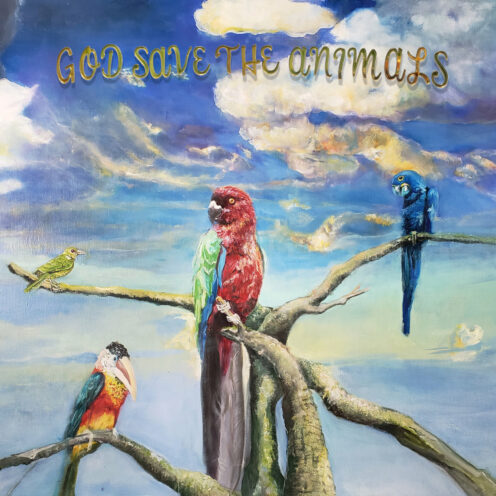
Alex G doesn’t do a lot of interviews, but for being a rising enigma in DIY and indie-rock, he seems like a pretty normal guy. In a recent Pitchfork feature, Giannascoli admitted to doing a lot of things on the fly; sure, he’s always writing, but when it comes to the prolific singer-songwriter’s experimental textures and vocal distortions, he’s really just trying to create something he finds interesting. (Ironically, he’s also convinced that every new project he releases is his worst, at least initially.) Giannascoli chose the title God Save the Animals based on intuition, and to further prove the down-to-earth nature of his work, he chose which studios the album was recorded at based on who was available that day.
All this to say, if Giannascoli isn’t being meticulous about his constantly evolving craft, he could have fooled us. At times, God Save the Animals sounds as lush (“Cross the Sea”) as Rachel Giannascoli’s watercolor artwork; elsewhere, it sounds barren, quiet, and lonesome (“Ain’t It Easy”). The album does exactly what most new albums should: it takes the best aspects of Alex G’s past work (his long-term penchant for storytelling, Rocket’s relatively straightforward, country-leaning compositions, and House of Sugar’s use of striking electronic flourishes and pitch-shifted vocals) and miraculously weaves them into something new. The album is rich with details that become more rewarding with every listen, making God Save the Animals not only an album of the year contender, but among the best work of the songwriter’s career.
The concept of God is referenced not only in the album’s title, but throughout; opening track and highlight “After All” is a beautiful, pitch-shifted ballad likely to remind fans of the sparse introduction to 2014’s DSU (“After Ur Gone”). “After all, people come and people go away/Yeah, but God, with me he stayed,” Giannascoli sings before the song expands into something fuller and more representative of the album at large. Later, on the strange pseudo-interlude “S.D.O.S.,” Giannascoli’s autotuned vocals arrive late in the track, offering bizarre but fitting metaphors (“God is my designer/Jesus is my lawyer”). But the more time you spend with God Save the Animals, the less religion seems to have to do with it. More common are loosely tied themes of reliability and consistency in life, as well as patience and grace for others. “My teacher is a child with a big smile/No bitterness,” Giannascoli sings on “No Bitterness,” a lovely, sprawling track that unexpectedly bursts into hyperpop territory. (He returns to this sandbox on album standout “Immunity,” which plays like a piano ballad written by 100 Gecs’ Laura Les.)
Perhaps strongest is the theme of forgiveness of self. “Forgive yesterday/I chose today,” Giannascoli belts triumphantly on the Southern-fried closing track, “Forgive.” It’s a powerful sentiment, and lyrically, it seems to steer the album even if it’s not always at the forefront. (On single “Runner,” one of Alex G’s most accessible songs yet, Giannascoli notes that he has “done a couple bad things” before letting out an otherworldly scream on a track that otherwise could play well next to Third Eye Blind on a 90s pop-rock radio station.) As fascinating as Alex G’s experimentation with tones and song structures is, it’s hard to deny that his strongest moments as a songwriter often come without filter or distortion. While Giannascoli claimed in the aforementioned profile that his songs rarely come from a place of total honesty, it’s hard to believe him on “Miracles,” where he (or his subject) contemplates how many more songs he has to write before he can pack up shop and call it a day. (This also arrives after the album’s most affirming verse: “You say one day, we should have a baby/Well right now baby, I’m struggling, we’ll see/You say one day, we should have a baby/Well God help me, I love you, I agree.”) Giannascoli delivers these verses in a vulnerable, nasally register against finger-plucked guitar that would make George Harrison blush.And yet, as straightforward of an album as God Save the Animals is – at least by Alex G standards – it’s still relatively difficult to pin down a definitive theme or meaning. Like the genres blended and showcased throughout, these songs jump from narrator to narrator, offering different perspectives on love, devotion, and understanding. These are simple themes that songwriters tap into every day, but they remain powerful for a reason, and after all, maybe it’s best not to look into them much deeper than that. Alex G sure isn’t.
 Miracles
Miracles